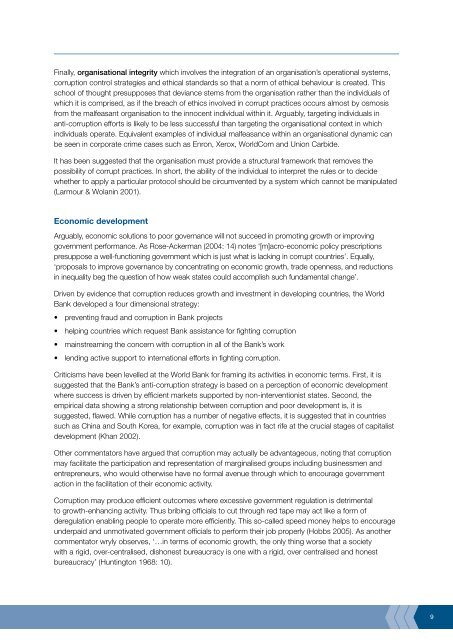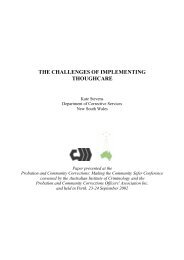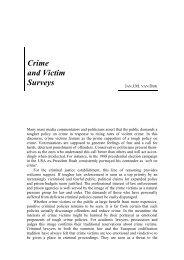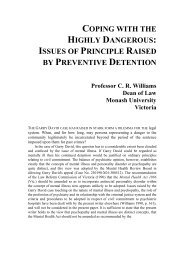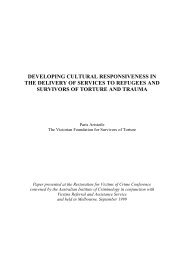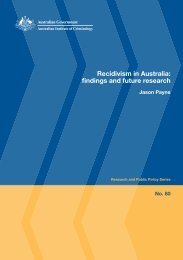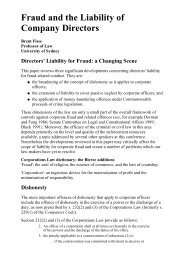Review of anti-corruption strategies Rob McCusker - Australian ...
Review of anti-corruption strategies Rob McCusker - Australian ...
Review of anti-corruption strategies Rob McCusker - Australian ...
Create successful ePaper yourself
Turn your PDF publications into a flip-book with our unique Google optimized e-Paper software.
Finally, organisational integrity which involves the integration <strong>of</strong> an organisation’s operational systems,<br />
<strong>corruption</strong> control <strong>strategies</strong> and ethical standards so that a norm <strong>of</strong> ethical behaviour is created. This<br />
school <strong>of</strong> thought presupposes that deviance stems from the organisation rather than the individuals <strong>of</strong><br />
which it is comprised, as if the breach <strong>of</strong> ethics involved in corrupt practices occurs almost by osmosis<br />
from the malfeasant organisation to the innocent individual within it. Arguably, targeting individuals in<br />
<strong>anti</strong>-<strong>corruption</strong> efforts is likely to be less successful than targeting the organisational context in which<br />
individuals operate. Equivalent examples <strong>of</strong> individual malfeasance within an organisational dynamic can<br />
be seen in corporate crime cases such as Enron, Xerox, WorldCom and Union Carbide.<br />
It has been suggested that the organisation must provide a structural framework that removes the<br />
possibility <strong>of</strong> corrupt practices. In short, the ability <strong>of</strong> the individual to interpret the rules or to decide<br />
whether to apply a particular protocol should be circumvented by a system which cannot be manipulated<br />
(Larmour & Wolanin 2001).<br />
Economic development<br />
Arguably, economic solutions to poor governance will not succeed in promoting growth or improving<br />
government performance. As Rose-Ackerman (2004: 14) notes ‘[m]acro-economic policy prescriptions<br />
presuppose a well-functioning government which is just what is lacking in corrupt countries’. Equally,<br />
‘proposals to improve governance by concentrating on economic growth, trade openness, and reductions<br />
in inequality beg the question <strong>of</strong> how weak states could accomplish such fundamental change’.<br />
Driven by evidence that <strong>corruption</strong> reduces growth and investment in developing countries, the World<br />
Bank developed a four dimensional strategy:<br />
•<br />
•<br />
•<br />
•<br />
preventing fraud and <strong>corruption</strong> in Bank projects<br />
helping countries which request Bank assistance for fighting <strong>corruption</strong><br />
mainstreaming the concern with <strong>corruption</strong> in all <strong>of</strong> the Bank’s work<br />
lending active support to international efforts in fighting <strong>corruption</strong>.<br />
Criticisms have been levelled at the World Bank for framing its activities in economic terms. First, it is<br />
suggested that the Bank’s <strong>anti</strong>-<strong>corruption</strong> strategy is based on a perception <strong>of</strong> economic development<br />
where success is driven by efficient markets supported by non-interventionist states. Second, the<br />
empirical data showing a strong relationship between <strong>corruption</strong> and poor development is, it is<br />
suggested, flawed. While <strong>corruption</strong> has a number <strong>of</strong> negative effects, it is suggested that in countries<br />
such as China and South Korea, for example, <strong>corruption</strong> was in fact rife at the crucial stages <strong>of</strong> capitalist<br />
development (Khan 2002).<br />
Other commentators have argued that <strong>corruption</strong> may actually be advantageous, noting that <strong>corruption</strong><br />
may facilitate the participation and representation <strong>of</strong> marginalised groups including businessmen and<br />
entrepreneurs, who would otherwise have no formal avenue through which to encourage government<br />
action in the facilitation <strong>of</strong> their economic activity.<br />
Corruption may produce efficient outcomes where excessive government regulation is detrimental<br />
to growth-enhancing activity. Thus bribing <strong>of</strong>ficials to cut through red tape may act like a form <strong>of</strong><br />
deregulation enabling people to operate more efficiently. This so-called speed money helps to encourage<br />
underpaid and unmotivated government <strong>of</strong>ficials to perform their job properly (Hobbs 2005). As another<br />
commentator wryly observes, ‘…in terms <strong>of</strong> economic growth, the only thing worse that a society<br />
with a rigid, over-centralised, dishonest bureaucracy is one with a rigid, over centralised and honest<br />
bureaucracy’ (Huntington 1968: 10).


